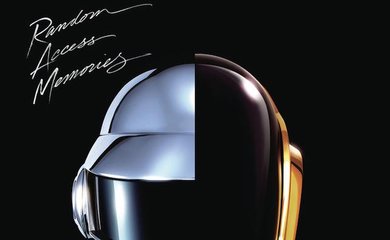Daft Punk’s latest album Random Access Memories resists easy categorisation. Undoubtedly an Event album, accompanied by an all-star guest list and Vice-sponsored short making-of documentary series, it is at times also a startlingly collection of disparate elements. The guest list includes 70s crooner Paul Williams, Pharell Williams, house/UK garage pioneer Todd “the God” Edwards, disco producer Georgio Moroder, indie artists Panda Bear and Julian Casablanca, and a host of veteran session musicians.
Though clearly an album deeply embedded in electronic dance music, this is Daft Punk’s most organic album yet. In lead-up interviews, the duo have spoken of “[recreating] what we used to do with machines and samplers, but with people.” It many ways, the album recalls the disco albums of the late 70s, with pulsing live drums and session musicians aiming for machinic precision. First single “Get Lucky” works well as a mission statement, with Pharell’s falsetto cooing over a lean repetitive groove looped to disco sublimity.
It’s definitely an audacious move in this age of computer generated EDM, and a risky one with few peers. One point of comparison is house gods Masters At Work’s 1997 Nuyorican Soul, which featured a similarly stellar guestlist and nostalgic viewpoint. But where Nuyorican Soul painstakingly recreated the disco past, Random Access Memories insistently foregrounds its contemporary status with vocoded vocals on almost every track. “Instant Crush” features Julian Casablancas from The Strokes crooning through a vocoder over a chunky New Wave groove. It’s instantly memorable and expertly balances the retro and futurist elements. “Fragments of Memories” features a nicely lazy vocal from Todd Edwards, looking back on a soon-ending holiday.
This is not to say that everything works quite so well, though. The eight-minute long “Touch” features the hammy Broadway vocals of Paul Williams alongside a children’s choir and an extremely cheesy disco section, and other discordant synth sections. It’s packed with ideas, and some of the string orchestration is lovely, but it’s a strange journey that doesn’t quite gel. In interviews, the duo have suggested this song to be the centrepiece of the album. Williams finishes the “you’ve given me too much to feel/you’ve almost convinced I’m real/I need something more, I need something… more.”
Given Daft Punk’s penchant for robotic masks, it’s an interesting twist on posthumanity to be sure, but one that makes sense in the light of Bangalter’s statement to the Guardian that “[We tried] to make robotic voices sound the most human they’ve ever sounded, in terms of expressivity and emotion.” A debateable claim. With a few exceptions – the monotonic “Doin It Right” – the vocoders work, but they don’t really connote very much at all.
But what does it mean, if anything? What is the point of making robots sound human? With few lyrics, it’s hard to really see the record as staking out much of a claim linguistically. Similarly, the cobbled-together signifiers of the 70s and 80s are pleasurable, but not really saying very much at all.
Random Access Memories is undoubtedly a unique sounding album, well-crafted in every sense. It sounds like a million dollars in an electronic moment where almost everything is made on laptops and the same few Digital Audio Workstations. Ambition permeates almost every bit of the album – something to be lauded in a time where music has become culturally devalued as important in itself.
It is a very good album. But a masterwork it is not, not really pulling all of these elements together into a completely convincing, whole artistic statement. It doesn’t really feel like it means anything at all. Random access memories indeed.

